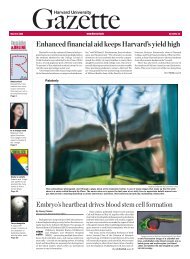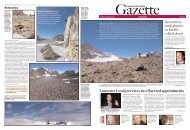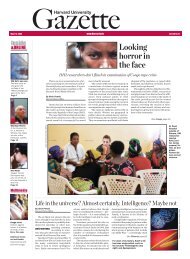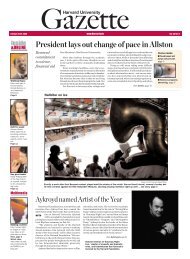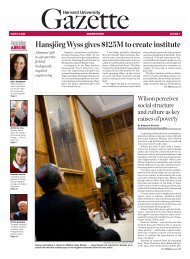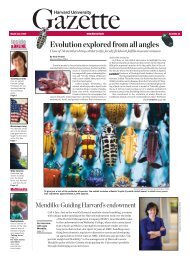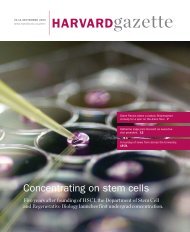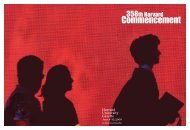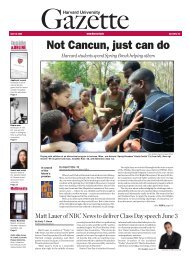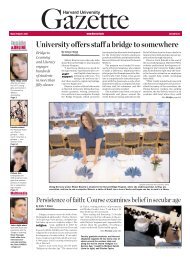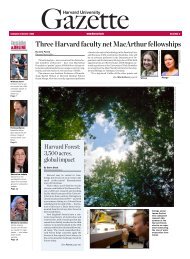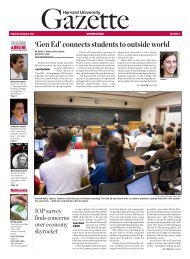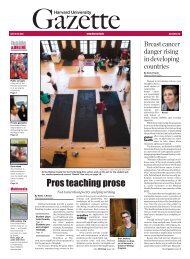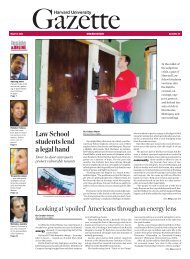Harvard University Gazette December 4-10, 2008 - Harvard News ...
Harvard University Gazette December 4-10, 2008 - Harvard News ...
Harvard University Gazette December 4-10, 2008 - Harvard News ...
You also want an ePaper? Increase the reach of your titles
YUMPU automatically turns print PDFs into web optimized ePapers that Google loves.
<strong>December</strong> 4-<strong>10</strong>, <strong>2008</strong> <strong>Harvard</strong> <strong>University</strong> <strong>Gazette</strong>/ 7<br />
Phillips Brooks House: A tradition of reaching out to the community<br />
This is the fourth in a series of<br />
<strong>Gazette</strong> articles highlighting some<br />
of the many initiatives and charities<br />
that <strong>Harvard</strong> affiliates can<br />
support through this month’s<br />
Community Gifts Through <strong>Harvard</strong><br />
campaign. The Community<br />
Gifts campaign allows affiliates<br />
to donate to a charity of their<br />
choice through cash, check, or<br />
payroll deduction.<br />
By Sarah Sweeney<br />
<strong>Harvard</strong> <strong>News</strong> Office<br />
Describing the work of Phillips Brooks<br />
House Association (PBHA) is no<br />
easy task. PBHA is a collective, so to<br />
speak, of student-run services and<br />
committees geared toward social<br />
justice. But that’s just the half of it.<br />
Founded in 1904, PBHA has<br />
flourished into more than 70 unique<br />
programs. And with more than 1,600 volunteers,<br />
PBHA is one of the most popular oncampus<br />
organizations, often dubbed “the<br />
best course at <strong>Harvard</strong>.” Providing everything<br />
from adult education, after-school programs,<br />
and legal services, to list but a few,<br />
PBHA offers a motley and expansive catalogue<br />
that rewards its student volunteers as<br />
much as it does the communities involved.<br />
But among PBHA’s most compelling and<br />
timely offerings are its immigrant programs.<br />
“As someone who often hears from community<br />
leaders,” says PBHA Executive Director<br />
Gene Corbin, “I can’t begin to express<br />
how valued our programs and longstanding<br />
relationships are in these communities.”<br />
The magnitude of PBHA’s work stems, in<br />
part, from its comprehensiveness. With unspoken<br />
mantras of “excluding no one” and<br />
“opportunity for all,” PBHA paves stable<br />
ground for immigrant populations so often<br />
lost in the shuffle.<br />
Take, for example, the Chinatown Committee<br />
— one of PBHA’s largest and most significant<br />
programs. Founded in 1976, and<br />
catering to Boston’s ever-growing Asian population,<br />
it now serves low-income residents<br />
in the oldest and most overcrowded Asianpopulated<br />
neighborhood in New England.<br />
The Chinatown Committee’s after-school,<br />
(See PBHA, next page)<br />
IN BRIEF<br />
FAS Supply Swap<br />
To continue the efforts of sustainability<br />
at <strong>Harvard</strong>, the Finance and Administration<br />
Office will hold a Faculty Arts and Sciences<br />
(FAS) Supply Swap on Dec. 17 from <strong>10</strong>:30<br />
a.m. to 1:30 p.m. in Lowell Lecture Hall.<br />
Members of the FAS are invited to donate<br />
and shop at the event. Those who bring donations<br />
are encouraged to only bring items<br />
that can be carried (no furniture or large<br />
items). All leftover supplies will be taken to<br />
the Recycling and Surplus Center and made<br />
available to the public. Please note that food<br />
and drinks are not allowed in Lowell Lecture<br />
Hall, and volunteers for the supply swap are<br />
greatly appreciated. For more information or<br />
to volunteer, contact Sarah Gordon at sgordon@fas.harvard.edu<br />
or (617) 495-3755.<br />
Cutler finds decline in cancer deaths<br />
Tied primarily to gains in<br />
behavior and screening<br />
By Amy Lavoie<br />
FAS Communications<br />
research<br />
Kris Snibbe/<strong>Harvard</strong> <strong>News</strong> Office<br />
The Otto Eckstein Professor of Applied Economics David Cutler: ‘The immense effort put into reducing smoking<br />
over the past few decades has really paid off.’<br />
Improvements in behavior and screening<br />
have contributed greatly to the 13 percent<br />
decline in cancer mortality since 1990,<br />
with better cancer treatments playing a supporting<br />
role, according to<br />
new research from David<br />
Cutler of <strong>Harvard</strong> <strong>University</strong>.<br />
While not the first to report a long-term<br />
decline in cancer mortality, Cutler’s is the<br />
first study to examine the reasons for this<br />
decline. Published in the fall issue of the<br />
Journal of Economic Perspectives, Cutler’s<br />
paper, titled “Are We Finally Winning the<br />
War on Cancer” looks at data for lung, colorectal,<br />
breast, and prostate cancer.<br />
“The decline in cancer is much larger<br />
than we commonly understand, and thus<br />
the benefits to society from reduced cancer<br />
mortality are even bigger than previously<br />
thought,”said Cutler,the Otto Eckstein Professor<br />
of Applied Economics in <strong>Harvard</strong>’s<br />
Faculty of Arts and Sciences.<br />
Cutler added that it had been unclear<br />
which of the many steps taken to fight cancer<br />
have been most effective. He found that<br />
while reasons for the decline vary by type of<br />
cancer, screening and behavioral changes<br />
have contributed both equally and substantially.<br />
Behavioral changes have had the greatest<br />
effect on lung cancer, Cutler said, where<br />
smoking cessation has had a tremendous<br />
impact. Other types of cancer have not been<br />
similarly affected by the reduction in smoking.<br />
“The immense effort put into reducing<br />
smoking over the past few decades has really<br />
paid off,” Cutler noted.<br />
Screening has proven especially effective<br />
in early detection of colorectal and<br />
breast cancer, but less so in identifying lung<br />
or prostate cancer. Colonoscopies also have<br />
a preventive value in removing polyps, and<br />
thus preventing the formation of colon cancer.<br />
“Among types of cancer where screening<br />
is valuable,” Cutler said, “the question becomes:<br />
How can we increase the number of<br />
people who are being screened Although<br />
costly, many types of screening are of enormous<br />
value.”<br />
Cutler found that treatment of cancer<br />
after its detection has been the least decisive<br />
of the three factors in cutting the cancer<br />
mortality rate.<br />
“Drugs that are quite expensive have<br />
been shown to extend life by only a few<br />
months among patients with metastatic<br />
cancer, which raises questions about the relative<br />
value of such costly treatments,” he<br />
said. “In contrast, while screening can be expensive,<br />
increased screening has led to significantly<br />
longer life expectancy for those<br />
diagnosed early with colorectal or breast<br />
cancer.”<br />
Cutler examined these four types of cancer<br />
because they are the mostcommon, with<br />
abundant data on patient outcomes. Data<br />
were examined from population registries<br />
of individuals with cancer, as well as clinical<br />
literature about the effectiveness of behavioral<br />
changes, screenings, and treatment.<br />
“We typically think of the war on cancer<br />
as developing a new cure,” said Cutler. “An<br />
equally important question is figuring out<br />
how we can take what we know and make it<br />
work for more people. We should think<br />
about the war as not just developing the next<br />
weapon, but using what we have in a smarter<br />
way. A health care system working for cancer<br />
would prevent people from getting it,<br />
catch it early, and then treat people accordingly.<br />
If our health care system was focused<br />
in this way, there could be a huge benefit.”<br />
The research was funded by the National<br />
Institute on Aging.<br />
HRO plays Weber, Yannatos, Mahler<br />
The sounds of conductors Weber,<br />
Mahler, and <strong>Harvard</strong>-Radcliffe Orchestra<br />
(HRO) director James Yannatos will flow<br />
throughout Sanders Theatre Friday (Dec.<br />
5) when the HRO takes the stage to perform<br />
“Weber, Yannatos, & Mahler.” The<br />
program will start at 8 p.m. and will feature<br />
Weber’s “Overture to Oberon,” Yannatos’<br />
“Lear Symphony No. 6,” and<br />
Mahler’s “Das Lied von der Erde.”<br />
Tickets are $21, $16, and $12 for the<br />
general public; $18, $14, and $<strong>10</strong> for senior<br />
citizens; and $8 for students. For tickets,<br />
contact the <strong>Harvard</strong> Box Office at<br />
(617) 496-2222, or purchase them online<br />
at www.ofa.fas.harvard.edu/tickets/<br />
details.cfmEVENT_ID=8074.<br />
New lab to open at HKS<br />
A ribbon-cutting ceremony will be held<br />
Friday (Dec. 5) at the <strong>Harvard</strong> Kennedy<br />
School (HKS) to commemorate the opening<br />
of the <strong>Harvard</strong> Decision Science Laboratory<br />
(HDSL), a new interdisciplinary laboratory<br />
available to researchers across the<br />
<strong>University</strong>. The ceremony will feature invited<br />
guests and dignitaries, and include remarks<br />
by <strong>University</strong> Provost Steven E.<br />
Hyman and HKS Dean David T. Ellwood.<br />
The HDSL was created to facilitate research<br />
on judgment and decision making,<br />
drawing primarily on psychology and economics<br />
to examine emotional, behavioral,<br />
cognitive, and biological systems. The lab<br />
will also pursue a teaching mission, providing<br />
students from different fields the opportunity<br />
to work side by side and exchange<br />
ideas regarding relevant theories,<br />
methods, and statistical analyses.<br />
After the ceremony, the HDSL (located<br />
at 124 Mt. Auburn St., Suite <strong>10</strong>1) will<br />
offer tours at <strong>10</strong> a.m., 11 a.m., and 1<br />
p.m., providing the opportunity to see and<br />
learn about laboratory operations and to<br />
sign up as lab researchers or subjects.<br />
Compiled by Gervis A. Menzies Jr.



